How relentlessly audiences look for a feature that identifies this artist and this artist alone.
By Mark Fenton
Published March 17, 2016
"Beauty without colour seems somehow to belong to another world."
—The Tale of Genji, translated by Arthur Waley"...the absence of colour speaks to me strangely and carries my thoughts beyond this world..."
—The Tale of Genji, translated by Royall Tyler
It is March 1st, 2016.
March is not in like a lion. March is in like a veritable pride of lions. I am writing this during the biggest snowfall of the year and I am steeling myself up to go into the storm and photograph it and I know that a real journalist would be out there already. Before the light fails.
But I am not much of a journalist and sitting at my desk writing has never been so appealing. So for the time being I will work with the photos I have and consider a gentler yet substantial snowfall of a few weeks ago. A snowfall that came with nothing more than dark skies and big flakes.
On the day in question I walked to Jackson Square and back along MacNab Street, that easy to miss passage sandwiched between Bay and James. I had wanted a break from comparing the parallel passages of The Tale of Genji (源氏物語 Genji monogatari) by Murasaki Shikibu (紫 式部) (hereinafter TG because I'm pretty sure you don't want to read all that again) quoted at the head of this essay.
For my purposes they're close enough that I'm encouraged to put off learning Japanese for the foreseeable future and leave it to competent professionals like Art and Roy to tell to me what Ms Murasaki has said.
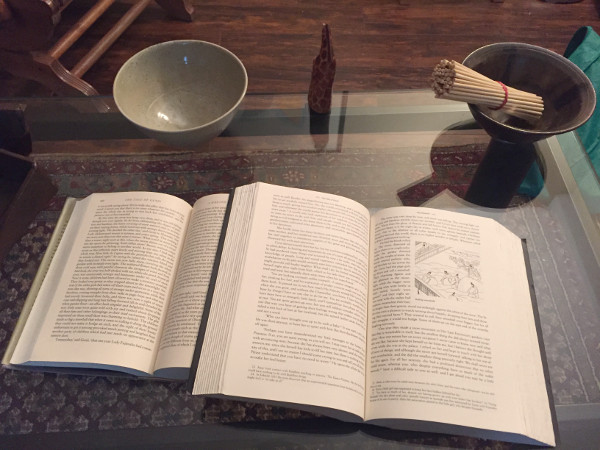
(And yes, you're probably fair in thinking that this kind of idle comparative reading is indicative of someone who should get out for some fresh air and exercise.)
MacNab. Consider the word. The Mac prefix in Scottish names means "Son of". And then "Nab" - to take, grab, steal. And that's exactly what the street feels like. A hodge-podge of houses nabbed from varied eras (Victorian, Edwardian, deco, post WWII) and equally varied cultures (Great Britain, East Europe, the Mediterranean).
I haven't had my DNA tested, but my best calculation based on anecdotal family chronicles is that my heritage is 71.875 percent Scottish. So MacNab is a street down which someone who looks like me might be expected to walk.
And so I am taking, grabbing, and stealing images from a place laid down by the hard labour of people who at a stretch could be called my forefathers, plus a whole bunch of people who by no stretch could be called my forefathers and who didn't get represented by the street names around here and I feel kind of bad about this and I hope I'm being accurate and fair.
As I take, grab, and steal my photo images what I'm seeing is a whole lot different than what is described in TG. I'm not faulting Murasaki's observational abilities. There probably weren't, back in Heian dynasty Japan, large metal objects painted hot colours that visually blast through the desaturation of snowfall.
Prince Genji would need to sleep for a thousand years to find large brightly coloured motorized objects randomly placed in the urban pedestrian's line of vision.
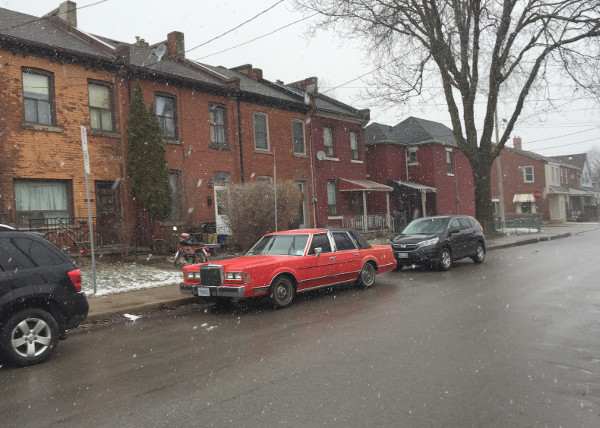
As here. Where I nab the image of a vintage Town Car with a word on its licence plate that I try and fail to find a meaning for on Google translate, and then discover that it's the name of a local business. I almost wish I hadn't
been able to source it at all and it turned out to be from a language no one has ever heard of and that I'd passed into an alternate reality.
It is the beauty of such colours that they shine more intensely in a snowfall. Particularly this colour which I call Pedro Almodóvar orange, a colour that appears so frequently in the director's film language, it not only provides an artistic signature, his actors are compelled to wear it when they show up with him at award ceremonies.

Listen, the snow is falling o'er town,
Listen the snow is falling ev'rywhere.
Between your bed and mine,
Between your head and my mind.
—Yoko Ono
It is now exactly 6:00 pm on March 1. There's no pretending it's a mere squall. The storm they've been promising us for the last two days is fully here. Just when they said it would be.
I've exhausted the subject matter at hand and don't have any other choice. Out I go bearing only my iPhone.
I'm back now. It was awful out there. I am new to the North End and can't just feel my way around. I was nearly run over.
It was the kind of snowfall that's like pellets coming from all directions, pellets that plunge deep into my inner ear. Yoko is right. This stuff makes a LOT of noise. From the safety of a desk in a heated office her words may sound like a zen koan. But once you're out in the storm they're pragmatic and cautionary.
Between your bed and mine. "Let's postone our sleepover till tomorrow, John. Tonight **please just stay off the roads."
Between your head and my mind. "We'll think of each other thinking of each other. We're never really apart."
Transport these gnomic lines to the texting age and you can bet some serious heart emoticons would get inserted here.
I got myself reoriented in the open field between a school and a community centre and I figured I'd be safe from heavy machinery if I stood in the middle of it.
I was struck by the sense of warmth emanating from the community centre. As though parents and children have charged it like a battery that allows the machine to stay powered on even after they've left. While this is a visually wholesome metaphor for community, I'm sure someone will label it environmentally feckless. Hydro pointlessly engaged, other than to serve as an accidental beacon that only a madman venturing out in a storm would benefit from.

There is a high-rise in the distance, one that I often use as a directional aid.
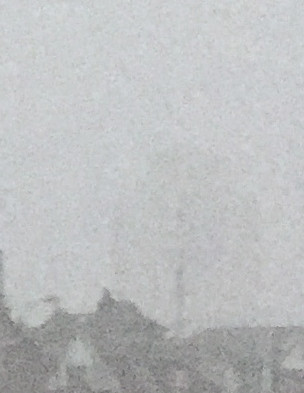
And at this moment it's so faint I wonder that people could live in it. It seems to require most of my imagination to even exist.
Here Genji's observation does hold up. Away from cars there is very little colour out in the falling snow, other than a strange patch of purple on a building just to the right of the school.
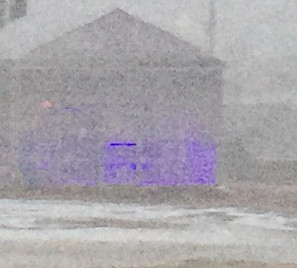
And I don't think this purple was really there. It appeared during a careful panning shot and corresponded with a written objection from my camera! I am not kidding. An angry statement flashed on the screen ordering me to 'slow down.' (!) No "please," no "I know it's cold and pellets of snow are pummeling your open eyes, but if you could possibly..."
No. Manners. At. All. Just an abrupt and rude "slow down," accompanied by what I now see was a purple rage. And surely the winter weather was harder on me, unprotected by an OtterBox®, than on it. This is going into the "area's for improvement" section of the evaluation, and things better have changed by contract renewal time is all I can say.
I ain't scared of the fall
I've felt the ground before
—The Weeknd
If you have been to the Hamilton Art Gallery anytime recently you may have seen the Kim Adams's Bruegel-Bosch Bus (an alliterative reference to two famous Flemish painters who made artworks with a lot of stuff going on in them.) It is the sculptural equivalent of a Funfair. It is excess. It is vulgarity in the Latin sense of "for the people." It is a collage of industrially produced toys and gadgets that makes sure there's something for everyone, adults and children alike.
In the past this piece had me running quickly for another room. I found it too overwhelming. But when I visited it in February my feelings changed completely.
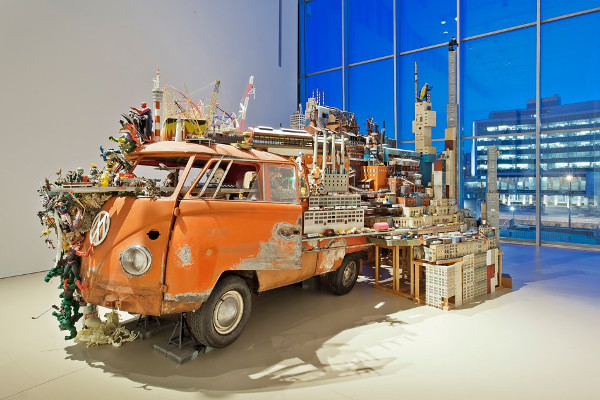
I had been approaching it as like someone who has to try all 200 dishes at an all-you-can-eat buffet. Forgetting that it's my visual banquet and I can consume it as selectively as I please.
Just as the I Ching is meant to be absorbed in chance excerpts, I could focus on a small random section of the bus and allow it to inform a moment in my personal narrative.
So I approached and allowed my gaze to find a little tableau. One that turned out to be more delicate than the factories, the machines, and the monsters that constitute so much of the work.
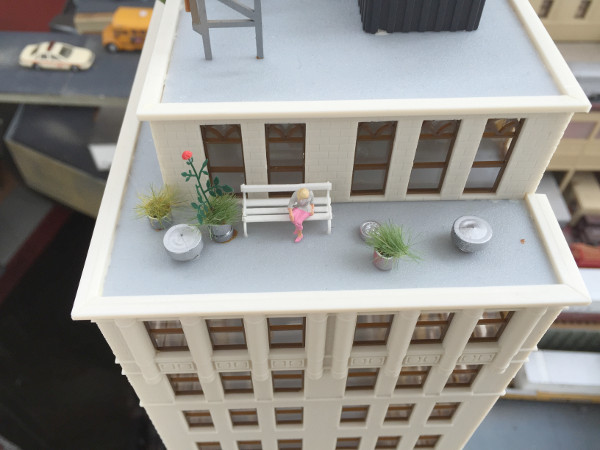
Here I found a solitary inner city tenant: a woman subsiding into her thoughts in the manner of the solitary urban women in Edward Hopper paintings.
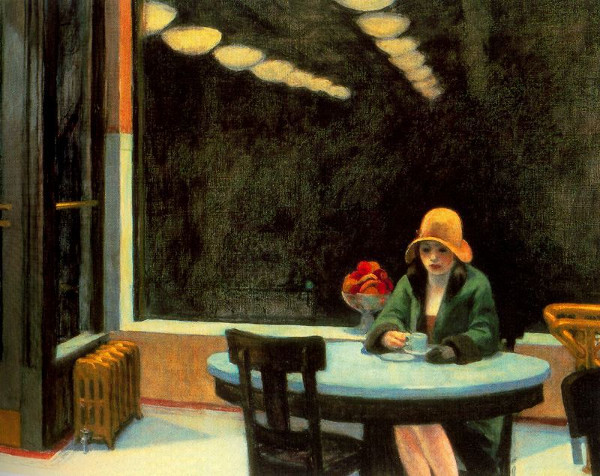
The downward gaze.
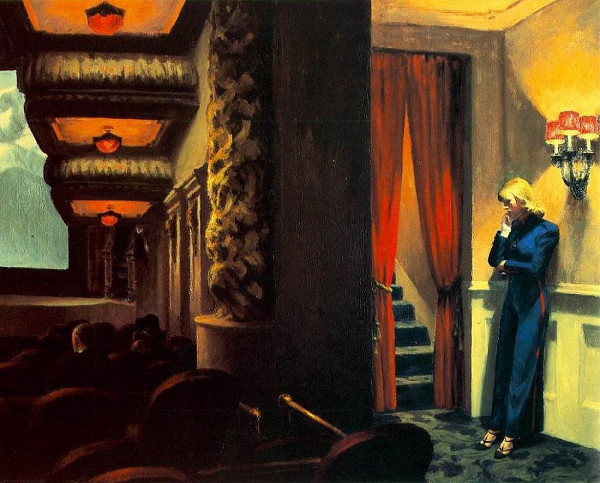
The abject tenor. And it's all in the pose and the situation. Not in the semi-defined facial expression.
Are these isolate souls thrown hard into the asphalt jungle, or are they gorging happily on introvert creativity? (I feel a disciplined writer would have phrased the dialectic of the previous sentence in the indicative rather than the interrogative, and put it up top as a thesis statement. But if I did it that way I'd be a different person. A person who stays inside over the course of a storm. A person who stays on topic over the course an essay.)
Do I need to state the obvious? That despite having the penthouse suite the tenant is alone. And exactly what aberration in building codes allows a penthouse terrace to be built with no railing? Which you'll agree makes her apparent depression considerably more alarming.
The tableau literally screams with the potential for a fall. For me it's worse than if the figure were in full WTC-9/11 plummet, fixed by invisible threads half way down the side of the building. For as Borges tells us "...it's easier to endure a terrifying event than to wait for it endlessly..."
I mentally backspace over this drama and consider a more benign one. One in which she goes onto the balcony periodically to ruminate, and then retreats to her bedroom. Which invites new questions. How exactly does she manage practical egress and ingress with only windows and no doors?
And who got the bench out there in the first place? Given its design, I'm guessing it was stolen from a park in the small hours of the night. I hate to say it, but isn't this just typical of the penthouse-income-bracket? However much they have, they still need to rip off the municipal taxpayer. For some people it's never enough, is it.
Here's a side view to expand the situation.
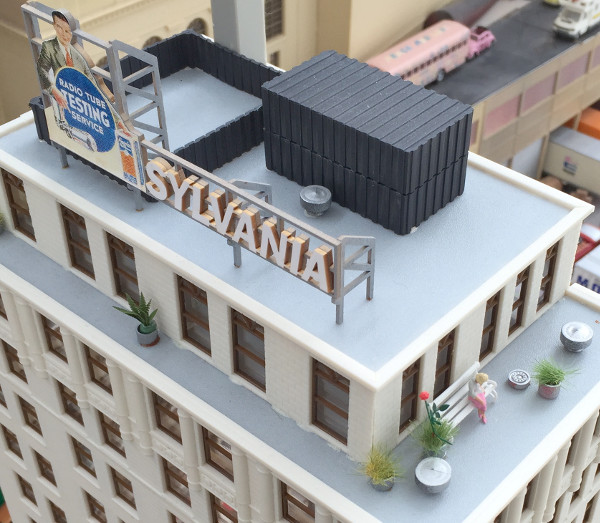
So. It's a commercial office building never intended for residential use. This is feeling a lot like a divorce settlement for an aging trophy wife lacking the expert legal counsel she'd have done well to retain. What she ended up with was the disused floor of one of his bankrupt office towers. ("It's the penthouse! What more do you want?") It's probably just elevator machine rooms and HVAC units and a thrift store mattress in there.
My eye is drawn to the tallest outdoor plant (makes sense; lots of sun) with its single blossom in Almodóvar orange, a colour that clashes unfortunately with her slacks but it's been a long time since she cared about those things. It's not like she goes out anymore...It's not like anyone comes over...
I pondered the scene until it became my baseline for the Bruegel-Bosch Bus. The key that would unlock the entire piece. I stared at it for so long I could have sworn I too was her invention. Just one of the numberless in the gallery of her mind.
"He's dreaming now," said Tweedledee: "and what do you think he's dreaming about?"
Alice said "Nobody can guess that."
"Why, about you!" Tweedledee exclaimed, clapping his hands triumphantly. "And if he left off dreaming about you, where do you suppose you'd be?"
—Lewis Carroll
I had stared at the figure on the displaced park bench for so long that she'd come to exemplify Bishop Berkeley's Esse est percipi (to be is to be perceived; this is back when philosophers had to write in Latin to get read). If you're unfamiliar with the 18th century philosopher, his theory denied that material objects could exist outside the mind of a perceiver.
I first encountered a riff on the Bishop's argument when I was a barely literate tot and Alice Through the Looking Glass was read to me and my reality was thereby seriously messed with.
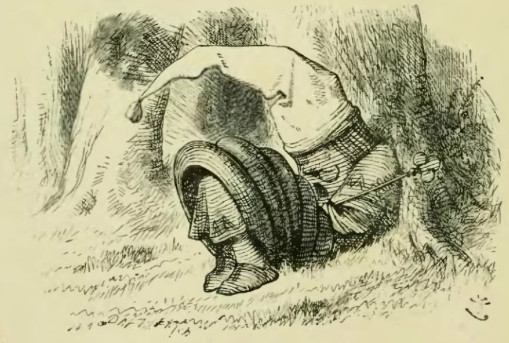
Carroll expresses it in the dormant Red King who dreams the whole novel, including those characters who are discussing his sleep and its metaphysical import. (What a double mirror effect that is!) Carroll renders this batshit so slippery and appealing that I was likely not the first reader to swallow it whole and to be left feeling that all my empirical data was henceforth indigestible and undernourishing and diseased.
How perfect that John Tenniel's illustration of the King's physical geometry is the apotheosis of naval gazing. Which could be said of Our Lady of the High-rise as well. And just as the surrealism of Alice might spring from within the dream Alice is dreaming of the Red King dreaming of Alice dreaming ad infinitum, the psychedelic madness of the bus had me thinking of Our Lady thinking of me ad infinitum.
Should she, heaven forbid, stand and move forward and fall to her death, would the mutant bus planet disappear, taking me with it? When I turn and walk away, what then becomes of her and her world?
Obviously we all remain exactly as we were. Which is probably what Samuel Johnson was feeling when, during an ambulatory discussion of esse est percipi with friend and biographer James Boswell, he kicked a stone and pronounced: "I refute it thus," i.e. things just are, regardless of who is or isn't watching.
Dr. Johnson's uncharacteristically taciturn and physical response implies that at a certain point dialogue takes us farther from, not closer to, what matters.
The heavy bear that goes with me...
Climbs the building, kicks the football...
—Delmore Schwartz
This is wacky. Delmore Schwartz, a mid-20th century poet and former philosophy student, is pushing the idea of mind/body dualism, a concept that's been unpopular with every significant philosopher since Descartes.
But it sure felt like I was dragging a heavy bear around with me when I was a kid. Probably because I was seriously unfit and wanted to stay inside and read of the world rather than experience it, a habit that's stayed with me into advanced adulthood (see Chapter I above.)
I grew up on the edge of Regina and I was an only child and this was before cable TV and when I was finally forced outside by parents, who knew the necessity of some physical movement for the developing child, I usually spent the time wandering empty expanses.
I don't recall kicking a football, and if a stranger had invited me to I'd have run screaming back home as I had been trained, tempting as it would have been to refute Bishop Berkeley by assaulting a physical object with a body part.
I loved alone-time. I loved the void. Void in almost 360 degrees of my turning. Void to the point where what determined the limits of my vision was the curve of the earth.
This is an experience foreign, I would guess, to most children in the Golden Horseshoe. It certainly inflated my childhood ego. Adamlike, I felt I had dominion over every fowl of the air and everything that creepeth upon the earth. (Though verily, there was seldom in my line of sight more fauna than the occasional squirrel.)
What was formative was that the expansive solitude made me imagine reality as a product of my consciousness, like the Red King's dream. (Now that I think of it, that's probably why kids are encouraged to kick footballs, catch baseballs, shoot pucks at a goal, etc.: to get grounded in materialism.)
And I developed the most remarkable relationship with my shadow! It was formed by, but clearly distinct from, the heavy bear that went with me and circulated and respirated and digested and ran reality through my five and prairie senses, early or late in the day.
My shadow was my slave. When I compelled my heavy bear to move its right arm, my shadow moved its. When my body nodded, my shadow nodded more deeply, as was fitting for a subordinate. When it was time to return home, my shadow acquiesced and disappeared to its underworld until I chose to resurrect it.
It is no accident that these years are called 'formative.' We go looking to recapture things we experienced in childhood, and forget that we can't. The negative space of Hamilton's schoolyards may be a poor substitute.
But here you'll see that on a certain day I am so intent on capturing a void in which I am centre and sole, I am so engaged in the idea of negative space that I fail to notice that it's nothing of the sort. I fail to notice the two figures moving through the exact middle of my panning shot.

Like Zapruder, who after he'd exposed the last of his 486 frames
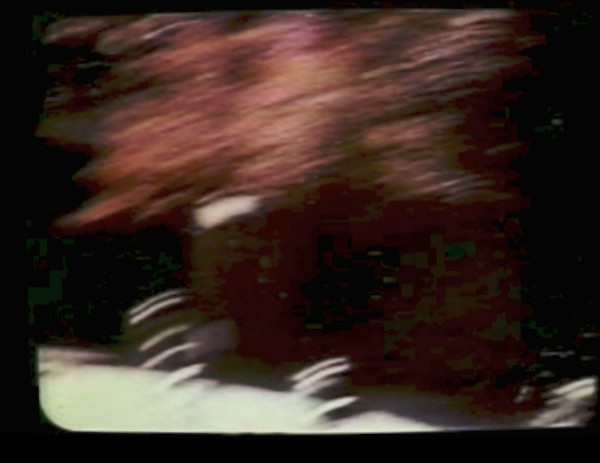
had to be told that his subject had been shot by more than a camera. For when we capture a scene, we blind ourselves to its action. Like a god surprised to see his creations moving hither and thither, in ways he had never foreseen.
The revelation of photographer-blindness struck like a bolt of lightning days after I had completed the penultimate draft of this essay. Passing through the same field at night I saw close up what had informed the purple patch in my snowstorm panorama. The splash of colour

I'd objected to in my desire for Genji-snow blandness was not a protest from the camera, but a heroic attempt to depict empirical truth in the worst conditions. Had I reversed the shot for a selfie, the glow would have painted me purple with embarrassment. (Though I still think my camera was needlessly rude.)
...something different from either
Your shadow at morning striding behind you
Or your shadow at evening rising to meet you;
—T.S. Eliot
In a recent interview with Dennis Purcell, Errol Morris shows the interviewer a "self-portrait."
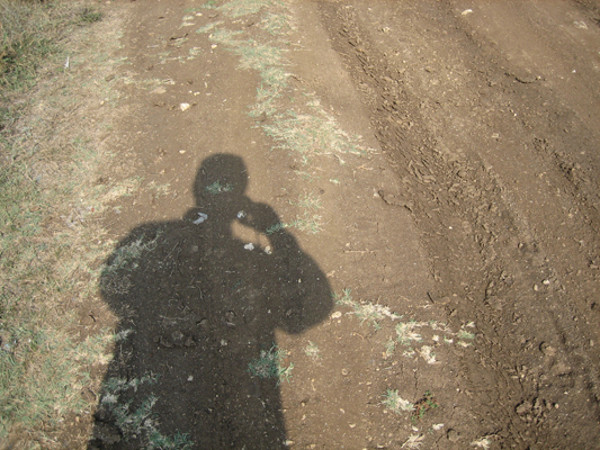
to which Purcell responds "That's a real Lee Friedlander." Referring to a motif in Friedlander's self-portraits that the photographer has been returning to since the 1950s.
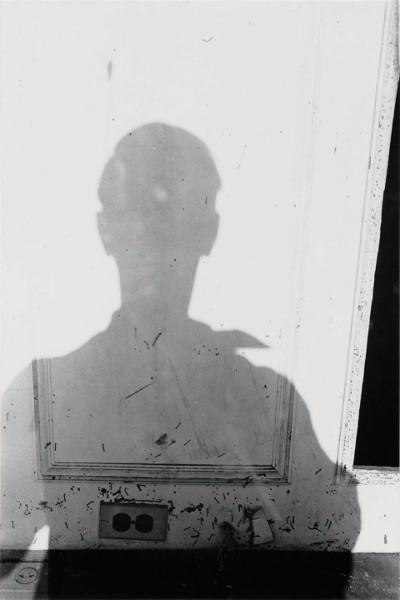
How relentlessly audiences look for a feature that identifies this artist and this artist alone. Something as simple as the childlike discovery of one's own shadow, or the equally childish joy of a curiously recurring orange, can be perceived as an artist's signature motif!
And the same obtains for mechanical mass production. It can even be legislated! Think of all those automobile manufacturers who trademark the name of an animal, such that other manufactures (of cars?... of any saleable object?... I've never been sure to what products a trademark extends, lacking the benefit of a full time attorney in my office) would face lawsuits if they used a word available in any dictionary. Perhaps this creature
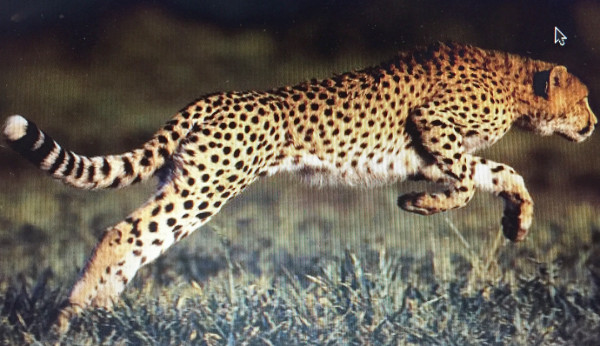
by being the species it is and assuming the above pose, can be sued for copyright infringement?

I would keep a low profile if I were a jaguar®.
I noticed a curious thing: a prison is always a noble place...but a funfair...
...by having fun. Whereas you can't deny a prison is a distinguished place.
—Louise Ferdinand Céline
When I lived in Regina the snow only ever got thicker and deeper once winter arrived in October, and it only began to retreat in mid-March, delivering us finally to the few days of T-shirt weather we call summer out there. Here in Southern Ontario Hermes teases us, letting Persephone out on furlough to pass briefly before us like a schoolchild crossing an open field. Then, chortling, he snatches her away for several more weeks in Hades.
And she had made just such a winter visit. The briefest most gorgeous appearance. With my mid-February MacNab journey striding behind me, and the deluge of March 1st rising to meet me, there she is, purging winter completely. Ground and sky are exploding into fields of colour, giving Hamilton a rare moment of light that simulates a prairie evening.
So I take, grab, steal as many seconds from eternity as the panorama setting of my bossy personal assistant - who is in a consistently better mood on sunny days and happy to do my will - allows me.
One such image I nab while crossing the pedestrian bridge on Mary Street. I'm looking eastward toward the noble and distinguished structures that confine people: the penitentiary and hospital.
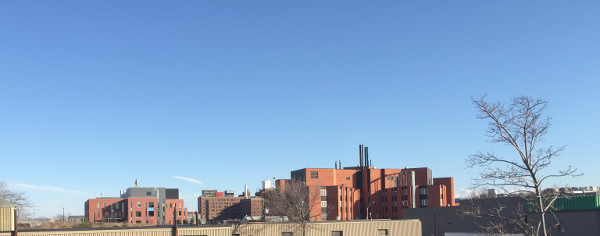
And I thank whatever gods might be that I am not a convicted murderer, a hospitalized moribund, a captive jaguar. That I can wander the planet at my whim.
I drink in as much as the region allows, and even infringe the tacit trademark of Lee Friedlander.

I wandered lonely as a cloud
That floats on high o'er vales and hills.
— William Wordsworth
On such a bright crisp day the high-rise required no help from me to exist.
But when I got home and looked at it closer I noted the tiny cloud floating above it, soft yet clearly defined such that it might have been the unwritten thought bubble for a Hopperlike woman perched dangerously outside her penthouse.
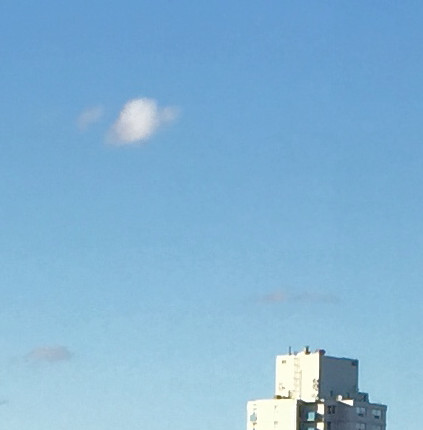
But is it me imagining her
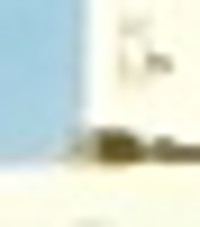
lost in whiteness on a misplaced park bench, a brilliant flower in Almodóvar orange

hiding just around the southwest corner of her unit? Or is it she
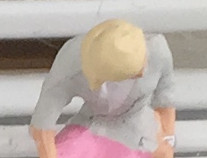
who is daydreaming me, a mere shadow of a body that circulates and respirates and digests and runs a world through it's five and urban senses? Daydreaming me into this place and this pose and these thoughts?
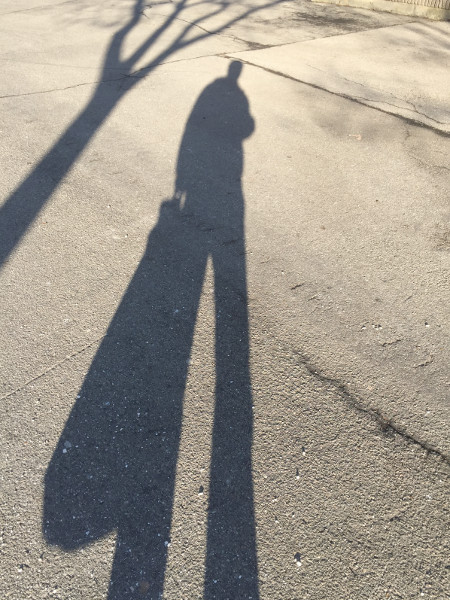
And am I even entitled to call this my shadow, if the world has already legislated the photo-shadow-self-portrait as the artistic right of somebody else?
By IanReynolds (registered) | Posted March 17, 2016 at 22:44:13
I was really intrigued by this passage specifically.
"I was struck by the sense of warmth emanating from the community centre. As though parents and children have charged it like a battery that allows the machine to stay powered on even after they've left."
It's this kind of feeling you experience when you walk down a street in New York, or any neighbourhood you enjoy. Hamilton is the first place I've ever lived where I feel that hum or energy walking down the street. I feel sometimes as if i could poke my head into any door I pass and find something interesting, taste something fantastic, meet some nice person.
By Philosophers (anonymous) | Posted March 19, 2016 at 10:06:04
George Berkeley roams in Hamilton. It is an amusing idea. If Locke Street exists, I wonder if we can name a street Berkeley St. My mind goes further… Can we have a Hume Street too?
When studying my degree in Psychology it was mandatory to study 2 semesters of Philosophy. I met a young lady recently who is studying Psychology and to my astonishment she told me Philosophy courses are not mandatory anymore. Berkeley is to blame I thought, with those silly ideas…… :)
By Selway (registered) | Posted March 19, 2016 at 22:10:40
Mr. Fenton! Welcome to the North End!
Your piece is another fine twist of the braid.
Couple of things. First, whatever rumours you may hear about what goes on in the House of Purple over by the medical centre, please ignore them. Really, is it likely that such things would be happening anywhere except in a third sub-basement out at Mac, where the reactor is right there at hand? I highly doubt it.
Secondly, I hate to be rude like your phone, but Berkeley wrote not esse est percipi but rather esse is percipi, as follows.
“For as to what is said of the absolute existence of unthinking things without any relation to their being perceived, that seems perfectly unintelligible. Their esse is percipi, nor is it possible they should have any existence out of the minds or thinking things which perceive them.”
This is a little strong. It is not so much that houses, mountains, rivers have no existence “distinct from their being perceived by the understanding”, it's just that they would not then be houses, mountains, rivers or indeed anything particular at all for us, so who cares? F'rinstance. I am proceeding west on Cannon near the Tim's at Bay, when I spot an abandoned hoverboard on the sidewalk. Not a plausible perception, so my attention is now fixed on the uncertainly identified object in the environs, which I study as I approach it, eventually perceiving that it is in fact four bolts transfixing a sheet of plywood, while also perceiving that my initial perception was rather a conception – as are all perceptions, which is Berkeley's point. More interesting, we are bound to go on our way incessantly con/perceiving i.e. knowing, or at least believing that we know, if you accept that a belief is a thought you are willing to act on. We can be accidentally unknowing, briefly, but it is pretty much impossible to deknow. Being is dual, and it is pretty much impossible to eg look at a table and see woodiness but not tableness, although we can sort of be focally aware of the one and then the other. This is of course a very Good Thing, or we would be forever floating about in a featureless and unstable flux, panning across a snowy void with few landmarks.
Incidentally, this site is acting like your damn phone and perceives the above as containing spam words. Therefore preventing me from posting anonymously. What the hell. Anyone out there have any idea what the trigger might be?
You must be logged in to comment.
There are no upcoming events right now.
Why not post one?